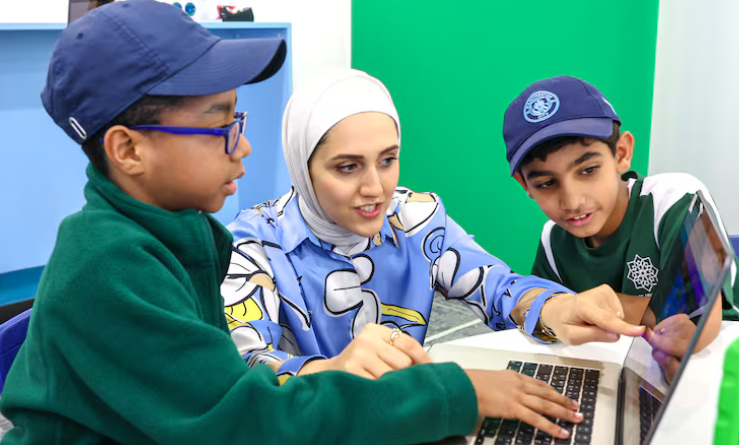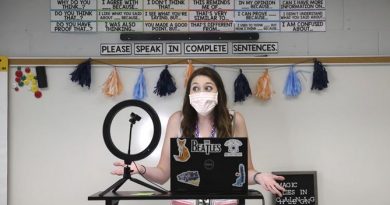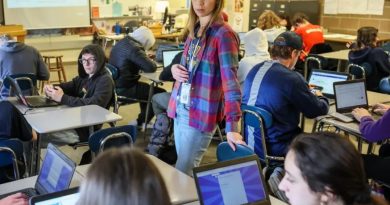Robotics through the lens of Arabic: This Abu Dhabi school is thinking differently
The school also launched an institute to train teachers and develop a more vibrant curriculum
One of the oldest schools in Abu Dhabi is finding new and innovative ways to change the way Arabic is taught in classrooms while instilling a love for the language among its pupils.
From using robots and puppets to hosting specialized camps to help improve communication skills, the American Community School of Abu Dhabi has launched the Arabic Institute of Excellence with an aim to develop a more vibrant curriculum for the language and create an advisory council of experts in the Middle East.
“Our hope is to bring Arabic to life,” said Dr Hanadi Dayyeh, chairman of the Arabic Institute of Excellence and director of Arabic studies at the American Community School of Abu Dhabi.
“We want pupils to be able to converse in Arabic fluently. So, instead of teaching them how to order from a book at a restaurant, we take them out to restaurants so that they can speak to the staff in Arabic.”
Using robotics to teach Arabic
“They want to learn robotics. They want to do amazing things with technology, and we’re doing that through the lens of Arabic,” highlighted Monique Flickinger, superintendent at the American Community School of Abu Dhabi.
“What we’ve had to focus on is upskilling the curriculum for today’s children.”
At the school’s astro lab, a tech specialist works closely with teachers and pupils to bring robotics, design thinking, and new technology into the classroom. Robots and puppets are used to help children with their speaking skills.

Apart from “using robotics in our classroom to teach Arabic,” the school also “runs language camps, experiential learning and outdoor learning in Arabic,” Dr Dayyeh added. Games and stories are also included to engage pupils in Arabic lessons.
Upskilling teachers
The institute’s advisory council will have representatives from the American University of Beirut, NYU Abu Dhabi, and the American University of Cairo. They will weigh in on the best practices and changes needed to revamp the teaching of Arabic and upskill teachers with certification programmes.
“We’re using the Institute as the hub, the place to invite Arabic teachers to come and learn from us and along with us. We’re going to be sharing resources with them and providing the training,” Dr Dayyeh said.
Ms Flickinger added that they will be “working with teachers not only within the UAE, but across the Middle East and we all have a common goal which is to get better at teaching Arabic and helping children fall in love with the language”.
Reviving the love for Arabic
Ms Flickinger noted a massive turnaround after they revamped the teaching strategies.
“Arabic is a mandated language, but we have seen pupils choosing to opt out of Arabic by grade six,” she said, because of “outdated teaching” models.
They saw more children interested in continuing Arabic lessons after they “created better teaching strategies. It saw pupils falling in love with Arabic. And now we are doubling the size of our classes for Arabic lessons”.
Dr David Wilmsen, a member of the advisory council and chairman of the department of Arabic and translation studies at the American University of Sharjah, highlighted how the school “revolutionised” the way Arabic was being taught. “They have a whole cadre of young teachers that they trained, and it’s just amazing to watch them in class. But they’re also bringing teachers from other parts of the Emirates and other parts of the Arab world.”
Such innovations are necessary to preserve a language that’s in “crisis”, he said.
“Despite being spoken by more than 400 million people across the world, the Arabic language is in crisis. It’s not going to become extinct as a spoken language but is in real danger of disappearing as a vehicle of modern writing,” Dr Wilmsen said.
Dr Zeinab Taha, another member of the advisory council and professor at the American University of Cairo, highlighted that the “biggest challenge is to break the stigma that the language is very difficult”.
“We have always been hearing students saying how much they hate Arabic. And that’s because, traditionally, Arabic was taught without much thought or care.”
Dr Taha added that the focus should be to teach pupils to use Arabic on a daily basis, where schools must create situations for them to go out and speak the language.
It’s one of the many challenges that the institute will take on, with Dr Dayyeh confident that they will “not only teach the language; but create a movement to raise awareness of Arabic’s importance in both regional and international contexts”.
Source: https://www.thenationalnews.com/news/uae/2024/10/04/robotics-through-the-lens-of-arabic-this-abu-dhabi-school-is-thinking-differently/




